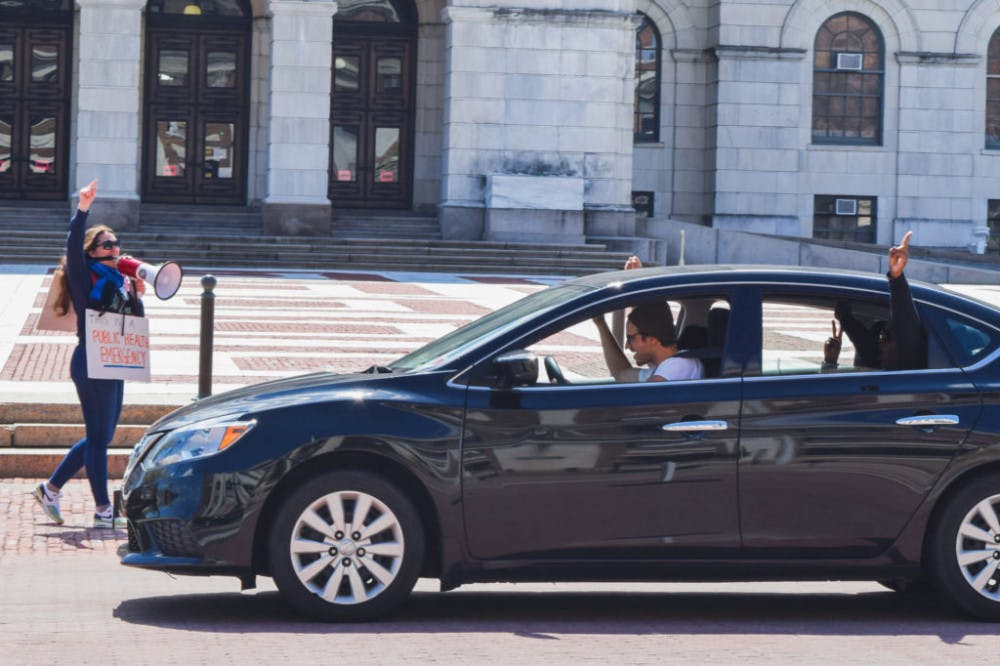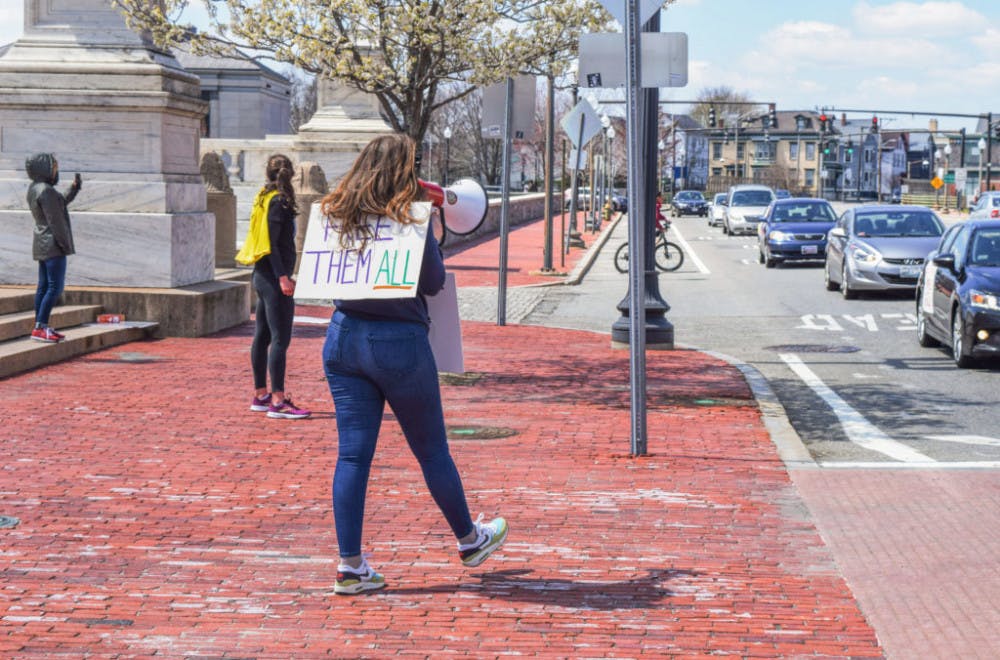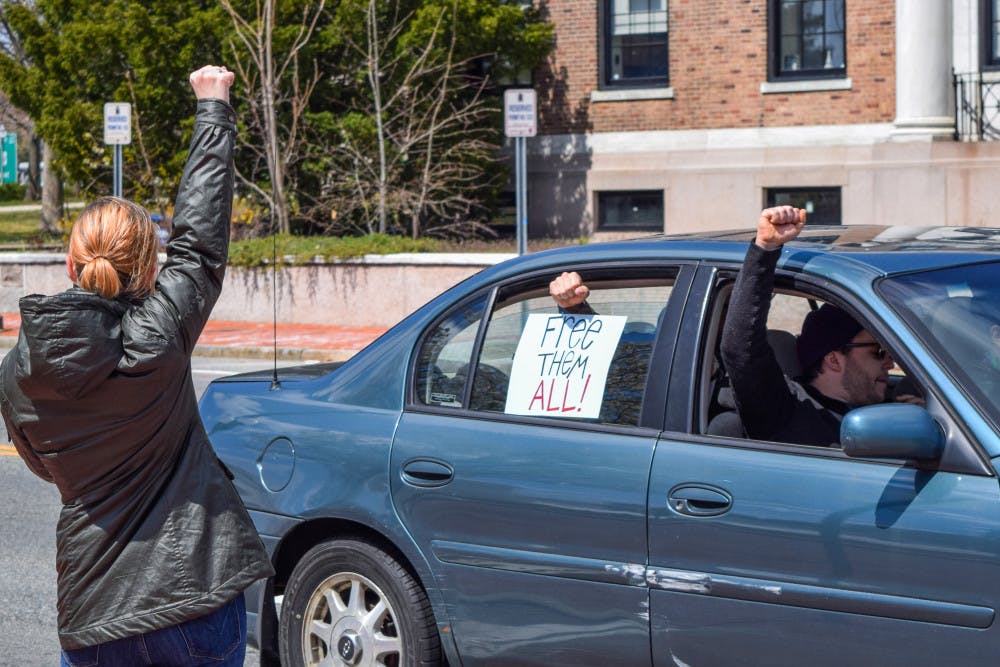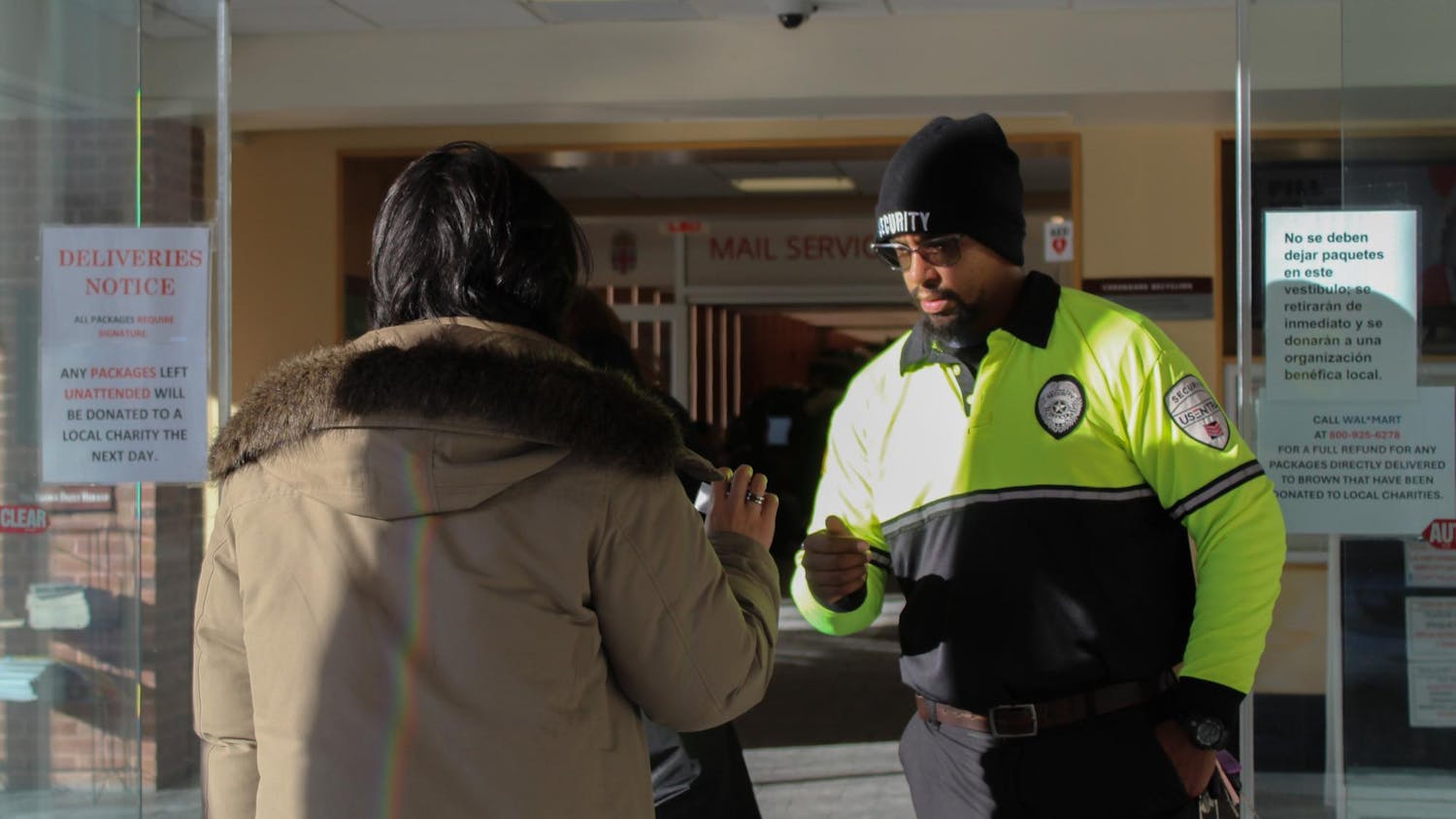Streams of protestors drove around the Rhode Island State House last Friday, blaring their horns and carrying signs in support of increased releases of incarcerated people from the Adult Correctional Institutions — releases that they say have taken on urgent, and potentially life-or-death-significance, in light of the COVID-19 pandemic.
Driving cars clad in signs including “Free them all for Public Health” and “Inaction is Murder,” over a hundred local activists brought three demands: first, the expedited release of people currently incarcerated, including all of those in pre-trial hearings, and those who are elderly or immunocompromised; second, the improvement of health and safety precautions inside state correctional facilities, such as by distributing free cleaning supplies to prisoners; and third, the securing of conditions that they say “uphold the human rights of those incarcerated,” including free communication via phone and email with loved ones on the outside.
A digital rally via Zoom was held simultaneously with the driving-based action, accessible for viewing on Facebook.
The April 17 protest was organized by a coalition of over 30 community organizations, elected officials and faith leaders. Friday’s action was the culmination of a week of activism and organizing which included phone- and email-banking and an art-making event.
“Public health is (about) all of our safety,” said Sheila Wilhelm, co-founder of Direct Action for Rights and Equality, in a press statement released last week. “Just because someone is incarcerated, this does not mean they are not part of the public.”
To date, concerns about serious health risks have prompted the release of 52 people from the ACI — which includes six prison buildings ranging from an intake service center to maximum security, all located in Cranston.
But many argue that 52 is far too few and express concern about the living conditions for those who remain incarcerated.
As of April 18, a total of 2,271 people are incarcerated across the ACI’s facilities, J.R. Ventura, chief of information and public relations at the R.I. Department of Corrections, wrote in an email to The Herald.
The protest took the form of a car rally since gathering on the street would have defied Gov. Gina Raimondo’s mandates that people stay six feet apart and not gather in groups of more than five, in light of the virus.
Raimondo responded to the protest during her daily televised COVID-19 press briefing Friday.
“I did hear the horns circling the State House and I appreciate their right to protest,” she said. “I am not, however, going to use my executive authority to free all the people at the ACI.”
As of early Sunday morning there were no reported cases of COVID-19 among incarcerated people at the ACI, Ventura wrote.
But according to Ventura, there have been five confirmed cases among staff at the ACI: four correctional officers and one health care staff member. And experts say the spread of the virus is just a matter of time.
[caption id="" align="aligncenter" width="650"]
“CDC guidelines aren’t made for prisons.”
To minimize the spread of the infectious disease, the Centers for Disease Control and Prevention have recommended measures such as avoiding close contact with people who are unwell, covering your mouth when you cough or sneeze and washing your hands and frequently-used surfaces with wipes, alcohol-based hand sanitizer or soap and water.
But these guidelines often run up against the reality of life in the ACI. Neither bleach wipes nor hand sanitizer is available to be purchased from the commissary due to “security purposes,” Ventura wrote.
Hand sanitizer is freely available in certain common spaces, such as officers’ stations, medical areas and designated restrooms, and the Rhode Island Department of Corrections is providing soap free of charge in light of the pandemic, Ventura added.
Health experts also recommend separating people who are sick or showing symptoms of potential sickness from healthy people. But inside a correctional facility, this proves challenging. To put it simply, “CDC guidelines aren’t made for prisons,” Brad Brockmann ’76, assistant professor of the practice of health services and policy and former executive director of the Center for Prisoner Health and Human Rights at the Miriam Hospital, told The Herald.
Because of security and other logistical concerns that determine a correctional facility’s operations, activists fear that social distancing cannot be a reality behind prison walls.
In addition, physical contact between staff and the incarcerated is often unavoidable: “Every pat down is a potential transmission. Every disciplinary situation. Every strip search is a potential transmission,” Bruce Reilly, a lawyer and activist based in New Orleans who was formerly incarcerated at the ACI, said during the online rally Friday.
In an essay published in the New England Journal of Medicine April 2, Professor of Medicine and Epidemiology and Director of the Center for Prisoner Health and Human Rights Dr. Josiah Rich and his co-authors urged immediate action to mitigate mass outbreaks of COVID-19 behind bars.
Among the authors’ recommendations is the immediate release of prisoners who are unlikely to commit further crimes, as well as those who are elderly or ill. Doing so would free up precious space to enable facilities to better manage the remaining population in the event of an outbreak.
The highest number of beds per room in the ACI is found in minimum security, where “dormitory-style rooms” have 12 beds in a 20-feet-by-20-feet cell, Ventura wrote to The Herald last month.
“There are currently two 12-men dormitory-style rooms operational, and even though they have 12 beds, they are not often filled,” wrote Ventura. “Most of the time there are eight to ten people in those rooms.” As of Sunday morning, Ventura wrote that these same circumstances still continue.
Community advocates also fear that safety from the virus inside a correctional facility means lockup, during which incarcerated individuals are largely confined to their cells to try to maximize social distancing. Those incarcerated at the ACI are spending more than 23 hours a day in their cells, according to a statement given by current prisoners during Friday’s online rally.
As is well documented, prolonged lockup results in “seriously negative psychological challenges for individuals who are incarcerated,” Brockmann said.
“A particularly vulnerable population”
Beyond the health concerns about the conditions inside correctional facilities, Brockmann underscored that the incarcerated population themselves are disproportionately at-risk.
“We’re talking about a particularly vulnerable population to begin with,” he said. “The vast majority of the incarcerated population in this country is low income,” Brockmann said during the online rally. “And therefore, not surprisingly, just generally in the community, they have a higher percentage of physical and mental health disorders. All of which contribute to higher risk.”
“Health is a function of socio-economic status in this county,” he said later in an interview with The Herald.
Advocates are calling for the release of incarcerated people, starting with the most medically vulnerable and those with less than a year left on their sentence.
Nationwide, about 40 percent of all prisoners have a chronic medical condition. About 15 percent of prisoners in the U.S. and 20 percent of those held in jails have asthma, a condition that places individuals at higher risk of suffering from COVID-19.
And the prison population is aging: According to RIDOC data, 41 percent of sentenced offenders in the state are over the age of 40.
[caption id="" align="aligncenter" width="650"]
“There are still going to be people inside”
While advocates are pushing for increased releases from the ACI, they are simultaneously calling for heightened health precautions to be implemented within correctional facilities for those who will remain inside. “No matter what we do,” Brockmann said, “there is still going to be a significant number of people inside.”
Increasing recreational time is among advocates’ demands, as is providing free masks, gloves and testing for all those incarcerated and the facilities’ staff.
“We’re in daily contact with the medical staff (at the ACI) to make sure we’re ramping up testing, make sure we’re doing our best to provide (personal protective equipment), doing our very best to clean the facility – and we will continue to do that,” Raimondo said at Friday’s daily press briefing. “And as testing gets better and as treatments get better, we’ll make sure that the most vulnerable everywhere, including in the ACI, will be the beneficiaries of that.”
Raimondo recognized that there is “a high degree of anxiety in the prison system” due to health concerns. “I want you to know I hear you,” she said at her daily press briefing April 9, addressing those imprisoned themselves or with an imprisoned loved one. “I’m aware of it.”
Advocates are hoping that this awareness will soon manifest in increased action.

ADVERTISEMENT




